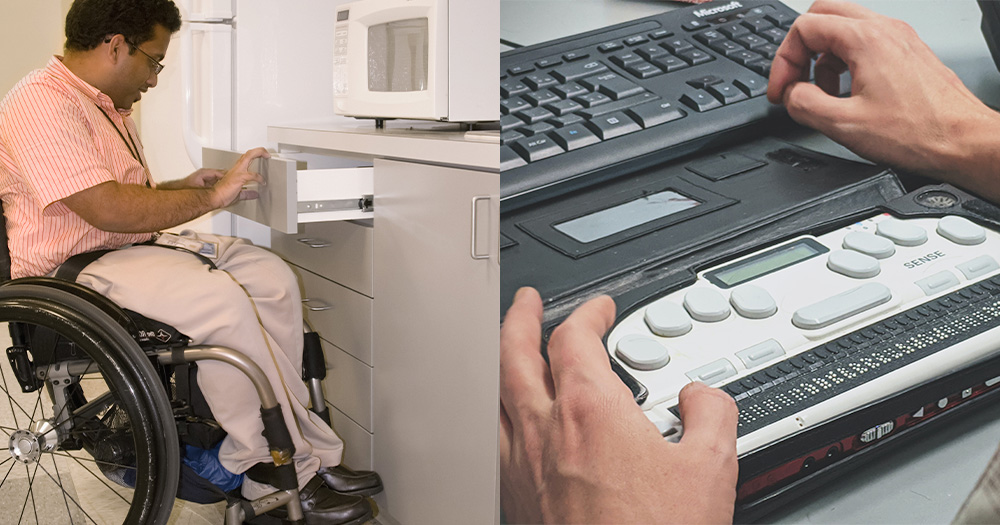Follow us on Telegram for the latest updates: https://t.me/mothershipsg
The Ministry of Manpower will be enhancing the Enabling Employment Credit (EEC), Minister of State for Manpower Gan Siow Huang announced on Mar. 1 in Parliament, at the Committee of Supply.
In 2022, the EEC benefitted more than 10,000 persons with disabilities (PWDs), including close to 2,000 who had not been in work for at least six months, she highlighted.
According to Gan, the EEC currently provides employers of people with disabilities, earning below S$4,000 a month, with permanent wage offsets of up to 20 per cent of monthly income, capped at S$400 per employee.
In addition, employers who hire PWD who have not been employed for at least six months receive an additional time-limited wage offset of up to 10 per cent of monthly income for six months.
This additional wage offset is currently capped at S$200 per employee.
Additional wage offset component and support duration to be increased
However, the additional wage offset component, Gan added, will be increased from 10 per cent to 20 per cent, and will be capped at S$400 per employee.
Meanwhile, the support duration will be increased from six to nine months.
Together with the permanent wage offset, this means that employers can receive up to 40 per cent wage offsets for the first nine months of employment when hiring a PWD, who has not been working for at least six months.
Such employers will then continue to receive 20 per cent wage offsets after the nine months are up.
"This means up to S$8,400 in wage offsets for the first full year of employment," Gan added.
This enhancement is also on top of separate government grants which provide employers with support to improve the workplace, redesign the job or provide training as needed.
The eligibility of the enhanced EEC will also be expanded to include permanent residents (PRs).
Workfare has been enhanced to improve retirement adequacy
The Minister of State also responded to a question by People's Action Party (PAP) Member of Parliament (MP) Rachel Ong about the retirement adequacy for people with disabilities and their caregivers.
According to Gan, eligible lower-income workers, including people with disabilities and their caregivers, receive the Workfare Income Supplement, which will boost their income and retirement savings through cash payments and CPF contributions.
Workfare has also been further enhanced from January 2023 to allow all eligible PWDs to qualify for the highest payout tier, regardless of age, she added.
"This will provide up to S$4,200 in annual payments", Gan elaborated.
There is also additional support provided by the government to PWDs and their caregivers if they are unable to work and have little retirement savings.
This includes the Silver Support scheme, which provides quarterly cash payouts of up to S$900 to seniors who had low or no incomes during their working years and have little family support.
The government has also introduced the Matched Retirement Savings Scheme, or MRSS, in 2021.
Under the MRSS, the government will match top-ups of up to S$600 per year to eligible seniors’ CPF accounts, Gan said.
These measures will also help boost the retirement adequacy of homemakers, she said.
What about the caretakers themselves?
Addressing support for caregivers who wish to return to the workforce, Gan said that they could "tap on Workforce Singapore’s suite of employment facilitation programmes and services".
For example, caregivers who need job search assistance can visit WSG’s Careers Connect and NTUC’s e2i's career centres for career advisory and guidance, said Gan.
For those who need a skills top-up, they can apply for the Career Conversion Programmes, Gan added, which provide training and salary support to employers who hire and reskill mid-career jobseekers for new occupations.
These programmes also provide higher support for caregivers, she said.
Proposal has been put forth for people with disabilities to be legally protected against workplace discrimination
Gan also noted that Workers' Party MP Gerald Giam had asked about what can be done to remove the stigma associated with disability.
She highlighted that the Tripartite Committee on Workplace Fairness has recommended that the proposed Workplace Fairness Legislation protect PWDs against workplace discrimination.
Gan further replied, "a first step that we all can take is to avoid stereotyping, and to recognise that everyone has skills and experience which they can bring to our teams at work."
Image by CDC via Unsplash and Sigmund via Unsplash
If you like what you read, follow us on Facebook, Instagram, Twitter and Telegram to get the latest updates.
